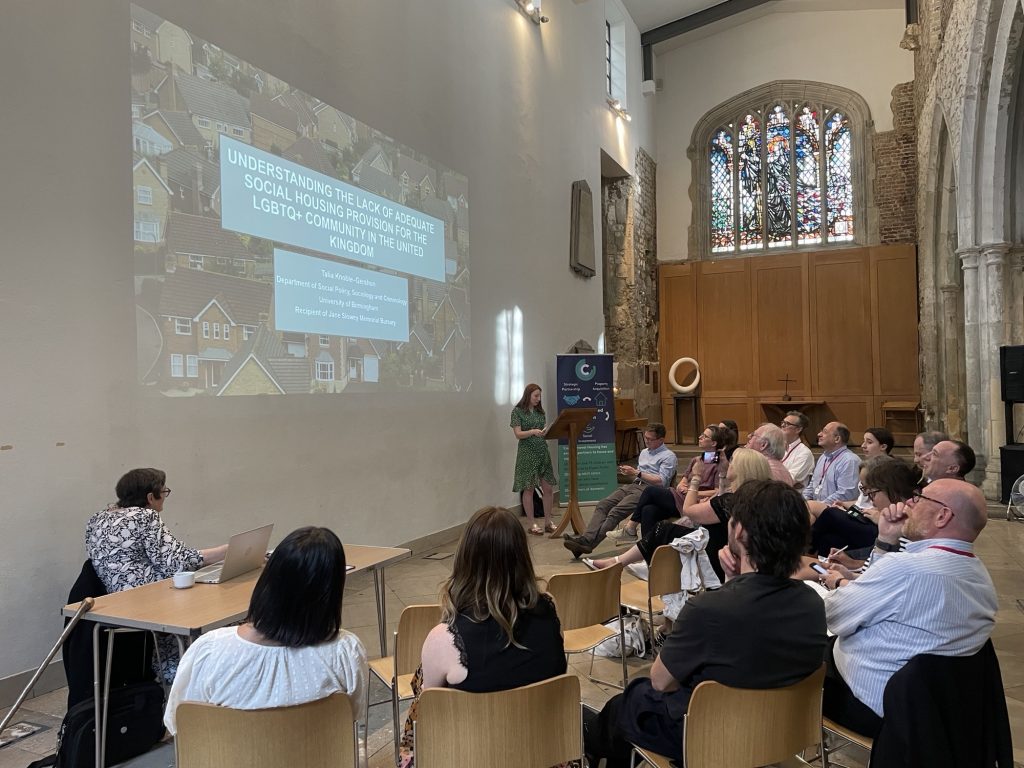
Birmingham Uni graduates share research into areas of housing and social injustice affecting marginalised groups
Commonweal Housing recently welcomed this year’s Jane Slowey Memorial Bursary students to share their final-year research findings with Commonweal staff, Trustees and friends.
In memory of Commonweal’s late Trustee, Jane Slowey CBE, who sadly passed away in 2017, the charity set up the Jane Slowey Memorial Bursary. The Bursary offers four students from the University of Birmingham’s School of Social Policy a £2,500 Bursary and mentoring support from Commonweal.
Slowey, who studied at the University of Birmingham, was an active campaigner against social injustices. She held many senior positions within the charity and third sector, including her time as Chief Executive of young people’s charity, the Foyer Foundation.
During her time on Commonweal’s Board, Slowey’s played a vital role in bringing the charity’s vision and ethos to life. In 2018, Commonweal created the Bursary to honour Slowey’s incredible work and support students focusing their dissertation on housing issues, social injustices, and young people.
This year’s Bursary recipients, Talia Knoble-Gershon, Abbie Dyke, Aminata Kamara, and Grace Hill, recently presented their dissertation findings at the annual celebratory event hosted by Commonweal. The student’s research focused on a range of housing and social injustices impacting marginalised groups, including care leavers; the lesbian, gay, bisexual, transgender and queer (LGBTQ+) community; youth offenders, and women.
Knoble-Gershon’s dissertation examined how the Government can tackle the lack of adequate social housing provision for the LGBTQ+ community, specifically the ageing LGBTQ+ population and the LGBTQ+ youth homeless community.
Her research recognised each LGBTQ+ person has differing and diverse social housing needs, which are dependent on individual circumstances, and therefore argued social housing must be looked at through an intersectional framework. She concluded that a cohesive relationship between the Government, third sector and those with lived experience is vital to ensuring the LGBTQ+ community can assess suitable social housing provision.
Talia Knoble-Gershon said: “I am grateful for being awarded the Jane Slowey Memorial Bursary this year. It allowed my love of social housing and fighting social injustice to grow, and I believe it played a large part in enabling me to gain a place on the Local Government graduate scheme for Haringey.”
In her study, Abbie Dyke explored the disproportionate levels of poverty and homelessness amongst care leavers. Following in-depth interviews with care leavers, social workers and foster carers, she found care leavers have strong barriers blocking their access to social, financial and occupational success and fulfilment.
Dyke’s research concluded that policy surrounding leaving care and the lived experience of care leavers is often different. As such, leaving care should not be based on biological age but rather a flexible, gradual process based on the emotional maturity and skill level of each young person.
Abbie Dyke said: “My research would not have been possible without the support and resources of Commonweal, and I’m very grateful. The participants I interviewed were from varied areas across the country and could not have been gathered without the support I received from Commonweal. I regularly spoke with Commonweal staff members who shared their contacts and started conversations with professionals who were invaluable to my research.”
Aminata Kamara’s research project outlined how place can influence youth offending. Overall she found that the environment young people grow up in and the structures they have around them can all contribute to the likelihood of them committing crime.
A key finding from Kamara’s research identified youth offending rates can be reduced through effective area-based initiatives, including increased community involvement, after-school activities and improved housing and living conditions, such as fixing poorly maintained building estates and providing social support.
Aminata Kamara said: “During the execution of my dissertation, I came across many obstacles as you normally do but having access to the support I got from being part of the Jane Slowey Memorial Bursary, made it easier for me to overcome these challenges. Which I really appreciate!”
Lastly, Grace Hill’s dissertation titled ‘Where does that leave the women?’ investigated the impacts of urban regeneration on women in East London. Hill conducted interviews with women across the London Borough of Tower Hamlets, in which she found regeneration in the area has resulted in a lack of affordable housing for locals, subsequently pushing women out of their homes.
Following Commonweal’s four-year partnership with the University of Birmingham, last year the charity announced it’s continuing the Bursary support for a further ten years. The four winners of the Jane Slowey Memorial Bursary for 2023/24 will be announced on our website shortly.
Ashley Horsey, Chief Executive at Commonweal Housing, said: “We would like to thank all four students for their hard work and compelling research into key areas of social policy. Through the Bursary, we are pleased to support students with their dissertations projects to enable them to delve deeper into the social injustice they are investigating and deliver hard-hitting research.”
